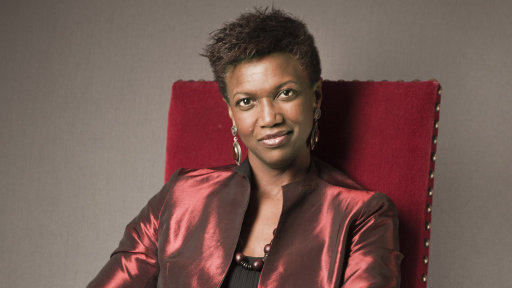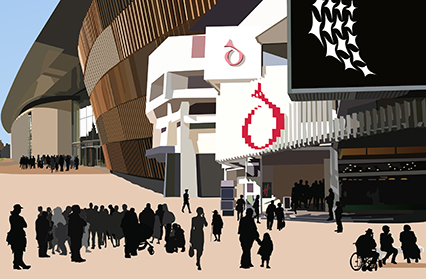This year, the BBC Cardiff Singer of the World competition is also featuring a busy programme of fringe events. Phil Morris went along to the Dora Stoutzker Hall at the Royal Welsh College of Music Drama today, June 18, for a participatory improvisation workshop given by a member of the 2015 panel of judges, the distinguished American soprano Claron McFadden.
Internationally renowned soprano Claron McFadden – one of the judges of this year’s BBC Cardiff Singer of the World competition – begins with a promise to deliver a ‘masterclass with a twist’. Her accompanying smile contains an equal measure of mischief and wisdom. The term ‘masterclass’ would suggest a process by which an apprentice refines their craft technique under the tutelage of an acknowledged expert. Yet McFadden’s aim for this session is simply to ‘delve into the world of spontaneous expression’.
There will be no piano, music scores or fears of hitting the right note; instead, a group of students from the Royal Welsh College of Music and Drama, and some plucky audience members, will join together to ‘broaden the palette’ of their singing voices in a series of improvisatory exercises.

McFadden’s world-class reputation has been earned through an impressively wide and diverse repertoire, which encompasses roles in Purcell’s King Arthur (Covent Garden) and Berg’s Lulu (Glyndebourne), and collaborations with the Nash Ensemble, Arditti Quartet and the Jazz Orchestra of the Concertgebouw. In addition to her formidable musicianship, McFadden is also a reflective thinker on the art of singing, drawing on the ideas of composers such as John Cage among others.
She talks about music as sound as much as she does the arrangement of notes from the chromatic scale. The exercises she sets for her workshop participants are designed to facilitate a collective exploration of the singing voice beyond the constraints of the chromatic scale. The effect is clearly liberating on the singers. The results are, at turns, chaotic, absurdly comic, dissonant, beautiful and joyous.
The first exercise, which led up to the spontaneous creation of what McFadden amusingly referred to as Opus 1, tasked a group of five music students and eight audience members with composing, through a series of improvisations, a choral piece that interlaced single lines of text volunteered by each of the participants. The group began by simply speaking the words they had selected, one after the other, going round in a semi-circle. During the next stage of the exercise each member was tasked with singing their line, making up their own brief snippet of music. For the final stage, the group hummed a ground note and were then invited to vocalise their lines in an extended choric improvisation.
In spite of the lack of a score, a coherent piece was created that swelled loudly yet harmonically as a temporary collective consciousness seemed to drive the group. What had previously been a text of unrelated banal thoughts – such as ‘Ostriches are good for the soul’ and ‘Age does not define me, it is only a number’ – gradually self-organised into a conversation that was, at least, musically satisfying. Without a cue from a conductor or leader, the singing hushed into whispers, before a single line – ‘It will all be okay’ – brought about silence. No one would necessarily seek to buy a recording of this piece, yet it amply demonstrated how a number of singers might freely improvise a stream of non sequiturs into an oddly moving musical expression.
A later exercise saw pairs of volunteers improvise duets by following simple instructions such as ‘make animal noises’ or ‘change the length of vowel sounds’. One highlight that emerged was a performance that sounded something like Bernstein’s Trouble in Tahiti sung by chickens. Another group improvisation started with something like the sounds of the rainforest, bird screeches and animal whoops, and ended with clapping and foot-stomping redolent of a gospel church.
If all of this sounds like huge fun, I can tell you that it was. Usually the phrase ‘audience participation’ sends a shiver of terror down my spine, yet I’m sure I wasn’t the only audience member who later regretted not taking up McFadden’s earlier invitation to join her onstage.
It would be a mistake, however, to regard this masterclass as merely a case of Cardiff Singer of the World letting its hair down half-way through the competition. That would be to severely underestimate the value of McFadden’s search for the mysterious, spontaneous and primal in musical performance. For, as any fan of music would readily acknowledge, good singing is not simply a question of mastering technique and music theory – it is foremost a matter of engagement with an audience, and ultimately moving those who listen. Lacking a sense of freedom, or the bravery to respond to the living moment during performance, the singer can only articulate a perfectly pitched but soulless calculation. Claron McFadden’s lesson, like her unique talent, lies in her equal measures of mischief and wisdom.
Illustration by Dean Lewis
Phil Morris was the co-founder and managing editor of Wales Arts Review.












